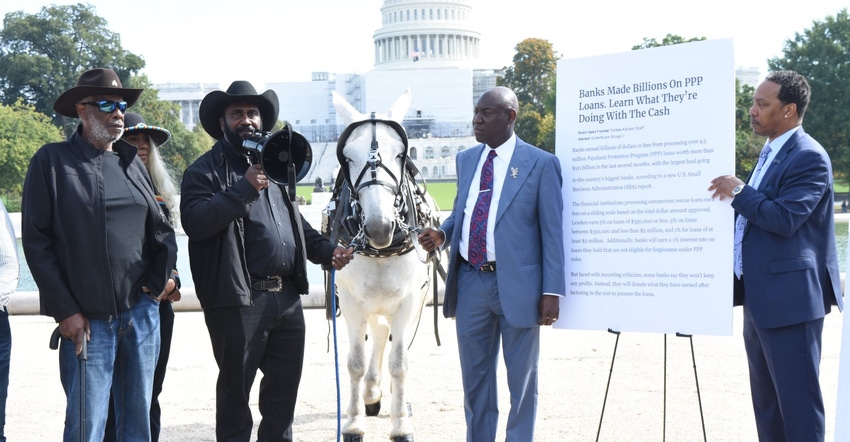Black farmers file lawsuit over debt relief delays
Socially disadvantaged farmers upset USDA broke its contractual agreement to pay up to 120% of outstanding loans.

Angered by the retraction of over $4 billion in debt relief and financial support pledged by the Biden administration, farmers of color held a protest rally and press conference Wednesday on the National Mall. Civil rights and personal injury lawyer Ben Crump joined the farmers to announce the filing of a class action lawsuit against the United States government, claiming it breached its contract with socially disadvantaged farmers under the American Rescue Plan Act.
Through section 1005, ARPA required USDA to relieve specified types of debt held by socially disadvantaged farmers. In section 1006, ARPA provided compensation for SDFs who previously suffered discrimination at USDA’s hands. After enactment of ARPA, USDA sent out letters to those eligible for the debt relief which included a contractual offer that USDA would pay off the amount of debt listed in the letter if the socially disadvantaged farmers accepted USDA’s calculation of their eligible debt and waived their right to appeal it.
Lester Bonner and Princess Williams, two plaintiffs in the civil suit, accepted USDA’s offer. However, the lawsuit states the U.S. government “broke its promise and breached its contractual obligations.”
Bonner, an Army veteran and Black farmer, operates a 113-acre wheat farm in Dinwiddie, Virginia, on which he grows wheat and beans. Williams, a Navy veteran and Black farmer, owns and operates a 73-acre farm in Lovingston, Virginia, and grows apples, melons, pumpkins, beans, onions and potatoes.
Quickly after USDA sent out letters to potential recipients of its debt relief, lawsuits were filed across the country challenging that the payments were discriminatory because it was based only on one’s color of skin. The recent Inflation Reduction Act repealed section 1005 of the ARPA and replaced it with debt relief for all distressed borrowers, not only those who would be classified as socially disadvantaged. The original language in ARPA called on the Farm Service Agency to pay up to 120% of direct and guaranteed loan outstanding balances as of January 1, 2021.
Related: USDA takes new approach to farmer debt relief
“Relief plaintiffs and other SDFs, reasonably relying on the U.S. government’s contractual commitments, invested in new equipment or land after they entered their ARPA contracts with the U.S. government,” the lawsuit states. “Now, as a result of the U.S. government’s breach of its contractual obligations, relief plaintiffs and other SDFs cannot service the debt the U.S. government contractually committed to pay and risk losing their farms and their livelihoods as a result of the U.S. government’s wrongful conduct.”
“Black and other farmers of color did exactly what the government asked them to do. They maintained or expanded their operations to strengthen America’s food supply during the COVID-19 crisis,” Crump says. “They believed the U.S. government’s promises. They took Congress and the administration at their word, expecting that the government would pay off their debt, as the USDA promised in writing. Instead, it was 40 acres and a mule all over again, 150 years later – broken promises that doomed generations of Black farmers to become sharecroppers and robbed Black families of billions in intergenerational wealth.”
John Boyd, founder and president of the National Black Farmers Association, estimates the 2021 provision would have provided aid to 15,000 farmers who held federal debts or had federal loans guaranteed by USDA.
“We have days, not weeks and months, to save many Black, Native American and other farmers of color from ruin,” says Boyd. “Black farmers are facing record costs for inputs like fuel and fertilizer and soaring land costs while battling droughts and extreme heat. We cannot and will not trust a president who doesn't honor his commitments.”
Discrimination payments
John and his wife Kara Boyd had litigated discrimination claims for years. They also lobbied the U.S. government to provide compensation for the discrimination they, and other SDFs, had suffered. Through their lobbying efforts and their direct conversations with powerful government officials, the Boyds impliedly offered the U.S. government a deal: they would cease their discrimination litigation if the U.S. government provided statutory compensation to socially disadvantaged farmers who had suffered discrimination in ARPA.
The U.S. Government accepted the offer when it passed Section 1006 in the American Rescue Plan Act, creating an implied contract with the Boyds and similarly situated SDFs. Then, the U.S. government breached its contract by passing the IRA, which amended Section 1006 such that it no longer provides compensation earmarked for SDFs who have suffered discrimination.
The Boyds are seeking relief from the U.S. government for breach of implied contract, in amounts to be determined at trial.
About the Author(s)
You May Also Like




.png?width=300&auto=webp&quality=80&disable=upscale)
